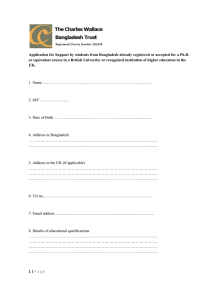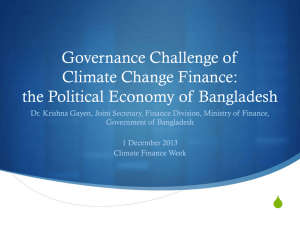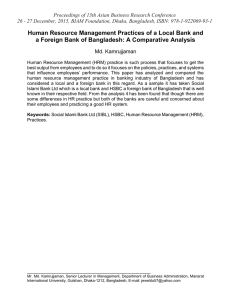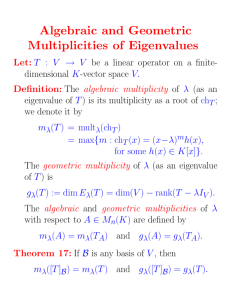Annex-A LIST OF ACRONYMS
advertisement
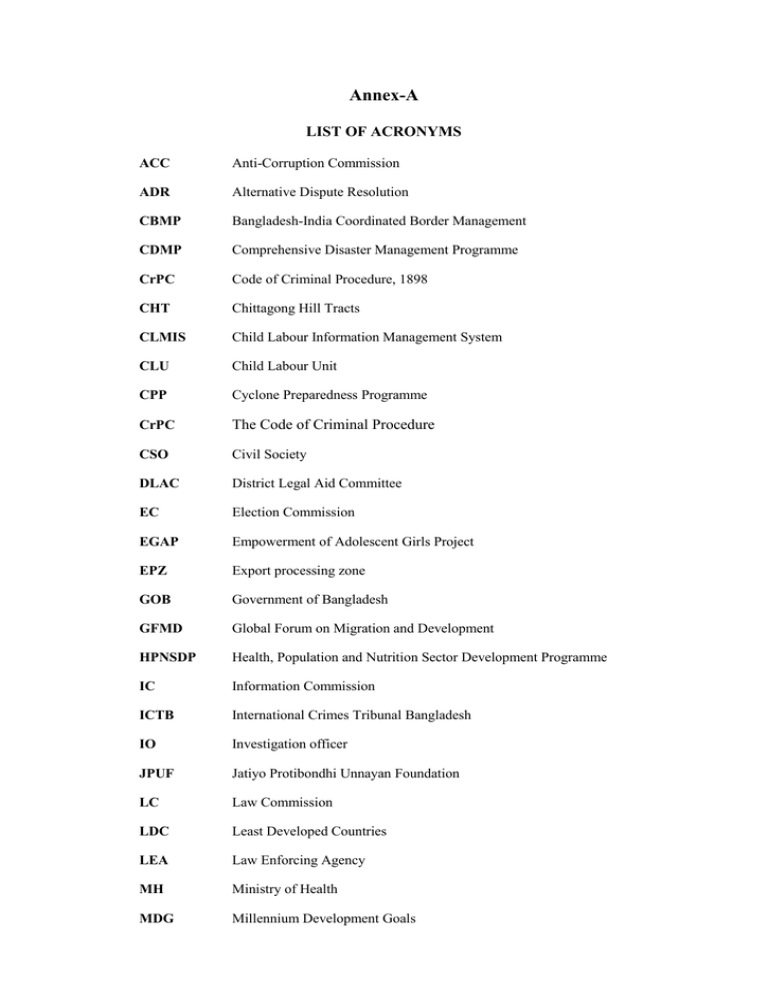
Annex-A
LIST OF ACRONYMS
ACC
Anti-Corruption Commission
ADR
Alternative Dispute Resolution
CBMP
Bangladesh-India Coordinated Border Management
CDMP
Comprehensive Disaster Management Programme
CrPC
Code of Criminal Procedure, 1898
CHT
Chittagong Hill Tracts
CLMIS
Child Labour Information Management System
CLU
Child Labour Unit
CPP
Cyclone Preparedness Programme
CrPC
The Code of Criminal Procedure
CSO
Civil Society
DLAC
District Legal Aid Committee
EC
Election Commission
EGAP
Empowerment of Adolescent Girls Project
EPZ
Export processing zone
GOB
Government of Bangladesh
GFMD
Global Forum on Migration and Development
HPNSDP
Health, Population and Nutrition Sector Development Programme
IC
Information Commission
ICTB
International Crimes Tribunal Bangladesh
IO
Investigation officer
JPUF
Jatiyo Protibondhi Unnayan Foundation
LC
Law Commission
LDC
Least Developed Countries
LEA
Law Enforcing Agency
MH
Ministry of Health
MDG
Millennium Development Goals
MHA
Ministry of Home Affairs
MOLE
Ministry of Labour and Employment
MOFA
Ministry of Foreign Affairs
MHPW
Ministry of Housing and Public Works
MOWCA
Ministry of Women and Children Affairs
MSW
Ministry of Social Welfare
NCLEP
National Child Labour Elimination Policy
NGO
Non-Governmental Organization
NHRC
National Human Rights Commission
NLASO
National Legal Aid Services Organization
PRB
Police Regulations of Bengal
PC
The Penal Code, 1860
PSC
Parliamentary Standing Committee
RAB
Rapid Action Battalion
RIA
Right to Information Act
RMG
Ready Made Garments
SC
Supreme Court
UH&FWC
Union Health and Family Welfare Centre
UNDP
United Nations Development Programme
UPR
Universal Periodic Report
TR
Test Relief
Annex-B
STAKEHOLDERS THAT PARTICIPATED IN THE NATIONAL CONSULTATIONS
Consultation-I
Non-Government Organizations
1. Ain O Shalish Kendra (ASK)
2. Odhikar
3. Bangladesh Environmental Lawyers Association (BELA)
4. BRAC
5. National Forum of Organizations Working with the Disabled (NFOWD)
6. Naripokkho
7. Human Rights Forum
8. Transparency International, Bangladesh (TIB)
9. Steps Towards Development
10. Democracy Watch
11. Bangladesh National Women Lawyers’ Association (BNWLA)
12. Bangladesh Legal Aid and Services Trust (BLAST)
13. Bangladeh Manabadhikar Bastobayan Sangstha
14. Manusher Jonno Foundation (MJF)
15. Bangladesh Nari Progoti Sangstha
16. Nari Uddyog Kendra (NUK)
17. Grameen Bank
18. Bangladesh Institute of Law and International Affairs
19. Nagorik Uddyog
20. Unnayan Bikalper Nitinirdharoni Gobeshona (UBINIG)
21. National Human Rights Commission (NHRC)
Consultation-II
Government Ministries/Divisions/Agencies
1. Prime Minister’s Office
2. Ministry of Foreign Affairs
3. Ministry of Home Affairs
4. Ministry of Health and Family Welfare
5. Ministry of Law, Justice and Parliamentary Affairs
6. Ministry of Education
7. Ministry of Food
8. Ministry of Agriculture
9. Ministry of Environment
10. Ministry of Chittagong Hill Tracts Affairs
11. Ministry of Disaster Management and Relief
12. Ministry of Information
13. Ministry of Labour and Employment
14. Ministry of Environment and Forest
15. Ministry of Women and Children Affairs
16. Ministry of Health and Family Planning
17. Ministry of Social Welfare
18. Ministry of Expatriates' Welfare and Overseas Employment
19. Ministry of Defence
20. Cabinet Division
21. Armed Forces Division
22. Anti Corruption Commission
23. Law Commission
24. Information Commission
25. Bangladesh NGO Affairs Bureau
26. Bangladesh Police
27. Rapid Action Battalion (RAB)
28. Border Guard Bangladesh (BGB)
29. Directorate of Prison
30. The Directorate General of Forces Intelligence (DGFI)
31. The National Security Intelligence (NSI)
32. Bangladesh Coast Guard
33. International Crimes Tribunal
Consultation-III
NGOs, CSOs, NHRC, GO
Non-Government Organizations
1. Amrao Pari (We Can)
2. Ain-O-Salish Kendro
3. ASHIKA
4. BRAC
5. Bangladesh Karmajibi Nari (BKN)
6. Bangladesh Dalit and Excluded Rights Movement (BDERM)
7. Bangladesh Disabled Foundation
8. Bangladesh Legal Aid Services (BLAST)
9. Bangladesh Manobadhikar Bastobayon Sangstha
10. Bangladesh Mahila Parishad
11. Bangladesh National Women Lawyers Associations (BNWLA)
12. Bangladesh Nari Progoti Songho
13. Christian Commission for Development in Bangladesh (CCDB)
14. Dustha Sastha Kendra (DSK)
15. Institute for Environment and Development (IED)
16. Manusherjonno Foundation
17. National Legal Aid Services Organization
18. Nagorik Uddoyog
19. Nari Uddoyog Kendro
20. Nari Unnayan Samiti (NUSA)
21. Naripokkho
22. Nijera Kori
23. Odhikar
24. Ongikar Bangladesh
25. PRIP Trust
26. The Refugee and Migratory Movements Research Unit (RMMRU)
27. Steps Towards Development
28. Shinning Hill
29. Transparency International Bangladesh (TIB)
30. WAVE Foundation
31. Unnayan Bikalper Nitinirdharoni Gobeshona (UBINIG)
32. National Human Rights Commission (NHRC)
Government Ministries/Divisions/Agencies
1. Prime Minister’s Office
2. Ministry of Foreign Affairs
3. Ministry of Home Affairs
4. Ministry of Health and Family Welfare
5. Ministry of Law, Justice and Parliamentary Affairs
6. Ministry of Education
7. Ministry of Food
8. Ministry of Agriculture
9. Ministry of Environment
10. Ministry of Chittagong Hill Tracts Affairs
11. Ministry of Disaster Management and Relief
12. Ministry of Information
13. Ministry of Labour and Employment
14. Ministry of Environment and Forest
15. Ministry of Women and Children Affairs
16. Ministry of Health and Family Planning
17. Ministry of Social Welfare
18. Ministry of Expatriates' Welfare and Overseas Employment
19. Ministry of Defence
20. Cabinet Division
21. Armed Forces Division
22. Anti Corruption Commission
23. Law Commission
24. Information Commission
25. Bangladesh NGO Affairs Bureau
26. Bangladesh Police
27. Rapid Action Battalion (RAB)
28. Border Guard Bangladesh (BGB)
29. Directorate of Prison
30. The Directorate General of Forces Intelligence (DGFI)
31. The National Security Intelligence (NSI)
32. Bangladesh Coast Guard
33. International Crimes Tribunal
Consultation-IV
Non-Government Organizations
1. Ain-O-Salish Kendro
2. Bangladesh Environmental Lawyers Associations (BELA)
3. BRAC
4. Bangladesh Karmajibi Nari (BKN)
5. Bangladesh Dalit and Excluded Rights Movement (BDERM)
6. Bangladesh Disabled Foundation
7. Bangladesh Legal Aid Services (BLAST)
8. Bangladesh Manobadhikar Bastobayon Sangstha
9. Bangladesh Mahila Parishad
10. Bangladesh National Women Lawyers Associations (BNWLA)
11. Bangladesh Nari Progoti Songho
12. Christian Commission for Development in Bangladesh (CCDB)
13. Dustha Sastha Kendra (DSK)
14. Ghatok Dalal Nirmul Committee
15. Human Rights Forum
16. Institute for Environment and Development (IED)
17. Integrated Community & Industrial Development Initiative in Bangladesh (INCIDIN
Bangladesh)
18. Manusherjonno Foundation
19. National Legal Aid Services Organization
20. Nagorik Uddoyog
21. Nari Uddoyog Kendro
22. Nari Unnayan Samiti (NUSA)
23. Naripokkho
24. Nari Progoti Songgho
25. Nijera Kori
26. Odhikar
27. Ongikar Bangladesh
28. PRIP Trust
29. The Refugee and Migratory Movements Research Unit (RMMRU)
30. Save the Children, Bangladesh
31. Steps Towards Development
32. Sommilito Samajik Andolon
33. Transparency International Bangladesh (TIB)
34. WAVE Foundation
35. National Human Rights Commission (NHRC)
Government Ministries/Divisions/Agencies
1. Prime Minister’s Office
2. Ministry of Foreign Affairs
3. Ministry of Home Affairs
4. Ministry of Health and Family Welfare
5. Ministry of Law, Justice and Parliamentary Affairs
6. Ministry of Education
7. Ministry of Food
8. Ministry of Agriculture
9. Ministry of Environment
10. Ministry of Chittagong Hill Tracts Affairs
11. Ministry of Disaster Management and Relief
12. Ministry of Information
13. Ministry of Labour and Employment
14. Ministry of Environment and Forest
15. Ministry of Women and Children Affairs
16. Ministry of Health and Family Planning
17. Ministry of Social Welfare
18. Ministry of Expatriates' Welfare and Overseas Employment
19. Ministry of Defence
20. Cabinet Division
21. Armed Forces Division
22. Anti Corruption Commission
23. Law Commission
24. Information Commission
25. Bangladesh NGO Affairs Bureau
26. Bangladesh Police
27. Rapid Action Battalion (RAB)
28. Border Guard Bangladesh (BGB)
29. Directorate of Prison
30. The Directorate General of Forces Intelligence (DGFI)
31. The National Security Intelligence (NSI)
32. Bangladesh Coast Guard
33. International Crimes Tribunal
Annex-C
HUMAN RIGHTS RELATED LEGISLATIONS ENACTED DURING 2009-2012
ACTS ENACTED IN 2012
1.
Human Trafficking Deterrence and Suppression Act, 2012
2.
Mutual Legal Assistance Relating to Offences Act, 2012
3.
Money Laundering Prevention Act, 2012
4.
Anti Terrorism (Amendment) Act, 2012
5.
Pornography Control Act, 2012
6.
Bangabandhu Poverty Reduction and Rural Development Academy Act, 2012
7.
Prime Minister’s Education Assistance Trust Act, 2012
8.
Competition Act, 2012
9.
Workers of Public Industries for the Production of Goods (Service Condition)
Act, 2012
10.
Disaster Management Act, 2012
11.
Hindu Marriage Registration Act, 2012
12.
Wildlife (Preservation and Safety) Act, 2012
ACTS ENACTED IN 2011
1.
Disclosure of Public Interest Related Information (Protection) Act, 2011
2.
Vagrancy and Distress People (Rehabilitation) Act, 2011
ACTS ENACTED IN 2010
1.
National Identification Registration Act, 2010
2.
Bangladesh High-Tech Park Authority Act, 2010
3.
Insurance Act, 2010
4.
Ethnic Minorities Cultural Institution Act, 2010
5.
Bangladesh Tourism Protected Area and Special Tourism Zone Act, 2010
6.
Economic Zone Act, 2010
7.
EPZ Labour Welfare Association and Industrial Relations Act, 2010
8.
Real-estate Development and Management Act, 2010
9.
Expatriate Welfare Bank Act, 2010
10.
Environmental Tribunal Act, 2010
11.
Climate Change Trust Act, 2010
12.
Domestic Violence (Prevention and Protection) Act, 2010
13.
Balumohal and Soil Management Act, 2010
ACTS ENACTED IN 2009
1.
Election Commission Secretariat Act, 2009
2.
Voter List Act, 2009
3.
Money Laundering Prevention Act, 2009
4.
Anti-Terrorism (Amendment) Act, 2009
5.
Right to Information Act, 2009
6.
Consumer Rights Preservation Act, 2009
7.
National Human Rights Commission Act, 2009
8.
Local Government (Pourashva) Act, 2009
9.
Mobile Court Act, 2009
10.
Local Government (City Corporation) Act, 2009
11.
Local Government (Union Parishad) Act, 2009
Annex-D
STEPS TAKEN TO PREVENT VIOLENCE AGAINST WOMEN DURING 2009-2012
The Government, under the leadership of the Hon’ble Prime Minister Sheikh Hasina, has
undertaken various efforts and initiatives for protecting violence against women and their
empowerment under implementation of the ‘Vision 2021’. As women constitute half of the
total population, Bangladesh has undertaken various activities of establishing overall equal
rights of women, their empowerment and integration into the mainstream of the overall
development process.
Constitutional guarantee: Article 19 (1) (2) of Bangladesh constitution states: “Equality of
opportunity as follows- (1) The State shall endeavor to ensure equality of opportunity to all
citizens. (2) The State shall adopt effective measures to remove social and economic inequality
between man and woman and to ensure the equitable distribution of wealth among citizens, and
of opportunities in order to attain a uniform level of economic development throughout the
Republic.” Article 28 (2) of the Constitution says- Women shall have equal rights with men in
all spheres of the State and Public Life.
National Women Development Policy: The National Women Development Policy was
formulated in 2011. In preventing violence against women, a number of legislations are in
place Suppression of Violence Against Women and Children Act, 2000 (Amended in 2003),
the Acid Control Act 2002 and the Acid Crime Prevention Acts 2002, Dowry Prohibition
Act, 1980 (amended as the Dowry Prohibition (Amendment) Ordinance, 1982), Child
Marriage Restraint Act, 1929, Human Trafficking Deterrence and Suppression Act, 2012.
The government has also signed the SAARC Convention on Preventing and Combating
Trafficking in Women and Children 2002. In October 2010, Bangladesh passed the Domestic
Violence (Protection and Prevention) Act. The legislation defines domestic violence as
physical, emotional, or sexual abuse, as well as financial damage, inflicted on a woman
or child by any member of the family by the Citizenship (Amendment) Act, 2009.
One-Stop Crisis Centre (OCC): One-Stop Crisis Centers are being operated in seven
divisional cities of Bangladesh where women and children victims of violence receive
health care, police assistance, social services, legal assistance, psychological counseling
and shelter service. In addition, sixty One Stop Crisis Cells (OSCCs) are being set up all
over the country. Under these Centers integrated support are being extended to the victims of
violence and women in crises.
National Trauma Counseling Centre: National Trauma Counseling Centers have been
established in Bangladesh and there is help line call centre 10921 support. Assistances
and support services are provided to oppressed & destitute, women through "Cell for
Prevention of Violence against Women". Any person can seek support for the violence victims
dialing 10921. Help line under MoWCA to provide legal, medical, rehabilitation and
counseling help to women and children victims of violence.
National Forensic DNA Profiling Laboratory (NFDPL): The National Forensic DNA
Profiling Laboratory (NFDPL) is the country's first ever forensic DNA profiling laboratory,
established at Dhaka Medical College by the Government under the Ministry of Women and
Children Affairs. The laboratory provides services to various investigating agencies to
solve violent crimes like, murder or rape. DNA analysis also helps in solving disputes
arising over issues like, paternity, maternity, immigration or inheritance, and determining
the identity of missing children, disaster victims or mutilated bodies. The laboratory is well
equipped to provide all kinds of DNA testing service related to criminal investigation.
Adolescent Clubs: All over the country 379 Kishore-Kishoree Clubs (Adolescent Clubs)
have been established. 11,370 adolescents are getting service through these clubs. In these
clubs, adolescents are getting necessary information about health, reproductive health,
protection against gender based violence and so on.
Women Support Centre (Prevention Cell and Shelter for Women victims): At the
divisional level Prevention Cell for Violence Against Women has been set up and
temporary shelter for the women victims have been arranged in order to render support to
vulnerable, destitute women who have been the victims of violence. The Prevention Cell
receives complaints of the victims, mediates conflict resolution through counseling,
settlement of amount of money pledged to be paid to bride by bridegroom ('den mohor'),
maintenance of wife and children, etc. In addition, legal aid for the women seeking legal
recourse is being provided to women being violated. In temporary shelter, women can stay
for a maximum period of six months with two children of aged not exceeding 12 years.
During their stay in the centre, medicine, food and other essentials are supplied free of cost.
District Legal Aid Cell by JMS to Prevent Violence against Women: At the central
office of Jatiya Mohila Sangstha there is legal cell to prevent violence again st women.
Cell activity started from 1996. In Last 3 years out of 286 complains conflict resolution
was done with 238 cases. From the prevention cell 2191 women have received legal
support, and help to collect pledge, means of money from accuser.
Safe Home for Women, Children and Adolescent Girls under the DWA: During the period
of judgment if in safe custody women, children and adolescent stayed with the normal
prisoners at jail become damaged both physically and mentally. That is why safe home
for Women, Children and Adolescent Girls at Kashimpur of sadar upazila of Gazipur
District under the Department of Women Affairs is established.
Stringent Punishment for Rape: There are articles in the Penal Code of Bangladesh
relating to rape. There are provisions that mandate the death penalty or life time
imprisonment for causing the death of a rape victim.
Immediate Action for Sexual Harassment: Steps have been taken to prevent Sexual
harassment (eve teasing) through social awareness raising program all over the country.
Insertion of section 509 of the Penal Code in the schedule of Mobile Court Act
empowering the Mobile Courts to take immediate action against eve teasers and offenders
of sexual harassment. According to direction of Hon'ble High Court Division to prevent
sexual harassment, committees have been formed in different Ministries and steps have
been taken for formation of such Complaint committees at the district level. Initiation of
counselling programme in schools to raise awareness regarding child rights issues is being
considered.
Prevent Acid attacks: In 2002, the Government passed two Acts, the Acid Control Act
2002 and the Acid Crime Prevention Acts 2002 (1st-end 2nd Act), restricting import and sale of
acid in open markets. Over the years, there has been a drastic fall incidences of this heinous
crime of acid attack/throwing. ‘Acid Cases Monitoring Cell’ under the Ministry of Home
Affairs is established to monitor legal proceedings prosecuting acid attacks against women
and girls. Some important features of the laws are as follows:
-
Establishment of a National Acid Control Council Fund;
Establishment of a Rehabilitation Centre for victims of acid crimes;
Treatment for victims of acid crimes;
Provision of Legal Aid for victims of acid crimes;
Locking up shops to prevent the sale of acid and banning transport engaged in carrying acid;
Temporary cancellation of acid selling licenses;
Capital punishment of the acid thrower and penalty of up to Tk. 1,00,000 (approximately US$
1,200);
- Judgment in special tribunals;
- Judgment in the absence of the criminal;
- Power of the Magistrate to take record of witnesses anywhere
Prevent Dowry: Previously; there had been widespread incidences of dowry in
Bangladesh. However, due to the mass awareness programmes conducted by the
Government as well as NGOs, there had been dramatic changes in the scenario. Now,
cases of dowry are hard to come by. Society was able to attach a stigma to the act of
giving and receiving dowry. The Dowry Prohibition Act of 1980 (amended as the Dowry
Prohibition Ordinance, 1982), prohibits dowry in all forms and makes it punishable by
imprisonment. The Law mandates the death penalty or life imprisonment to a husband
and his family for the murder or attempted murder of a woman for dowry.
Protecting Human Rights of Women Migrant Workers: With the support from the UNWomen during 2009-2010, the Government established the first resource centre so that
aspirant women migrants could obtain correct information about migration easily along with
the government and civil society. UN-Women has chalked out rehabilitation programms for
women returnees.
High Court Ruling on fatwa (Religious Edicts)s: The Hon'ble High Court Division
declared all extra-judicial punishments, including those made in the name of fatwas
(religious edicts), to the illegal.
Hindu Marriage Registration made as Optional: In June 2012 Honorable Prime Minister
Sheikh Hasina approves a new law that will introduce official marriage registration as
optional for Hindus in Muslim majority Bangladesh in a move designated to protect the
rights of women.
Government-NGO Collaboration for Protection of Violence against Women:
Present Government in collaboration with NGOs are working on women protection against
different forms of violence including rape, trafficking, acid attack and others. The NGOs are
also working significantly with the Government for victims rescue, counseling and
rehabilitation and replacement to the society.
Annex-E
15 YEARS OF THE CHITTAGONG HILL TRACTS (CHT) ACCORD
THE CHT ACCORD
“Under the framework of the Constitution of Bangladesh and having fullest and firm
confidence in the sovereignty and integrity of Bangladesh, the National Committee on CHT
Affairs, on behalf of the Government of the People's Republic of Bangladesh, and the
Parbatya Chattagram Jana Samhati Samiti, on behalf of the inhabitants of the Chittagong
Hill Tracts, with an objective to elevate political, social, cultural, educational and financial
rights and to expedite socio-economic development process of all citizens in CHT ... ...”
1.
THE CHITTAGONG HILL TRACTS ACCORD 1997
Following decades of protracted low-key insurgency in the three districts (Rangamati,
Khagrachari and Bandarban) of the Chittagong Hill Tracts (CHT) in South-Eastern
Bangladesh, a peacefully negotiated political solution was brought about to the problem in
1997 by the then Awami League Government led by Prime Minister Sheikh Hasina, kindling
hopes of peace and stability in the area. On 2 December 1997, a historic peace accord popularly referred to as the Peace Accord - was signed between the National Committee on
CHT Affairs representing the Government and the Parbatya Chattagram Jana Samhati Samiti
(PCJSS) representing the inhabitants of the CHT region. Chief Whip of the National
Parliament Abul Hasnat Abdullah, MP and Chair of the PCJSS Jyotirindra Bodhipriya
(Santu) Larma signed the accord in the presence of Prime Minister Sheikh Hasina, the
principal driving force behind this historic peace initiative.
For Bangladesh, which inherited the CHT insurgency problem from the then Pakistan and the
colonial era earlier, this peace initiative in the three hill districts was the first of its kind since
independence (1971) and represented a reaffirmation of its national values of peace,
democracy, inclusion, human rights and affirmative action for disadvantaged communities of
the society as enunciated in the Constitution. Apart from being an internal national pact
between the State and a group of ethnically diverse minority inhabitants with the purpose of
restoring lasting peace and stability in a geographically difficult and strategically vulnerable
region of the country, the Accord also addressed a wide range of longstanding cultural,
administrative and land related grievances of the ethnic minorities of the CHT region. It
categorically upheld their political, economic, social, cultural and developmental rights as
well as those of the Bangalee ethnic inhabitants of the CHT region. The CHT Accord also
creates for the first time since settlement of the tribal people in the region about five hundred
years ago, the provision and scope of expedited socio-economic development of this
geographically inaccessible region and opens it up for development initiatives by
international development agencies and NGOs side by side the Government. Last but not the
least, the Accord consciously promotes preservation of the language, culture, religion and
heritage of the ethnic groups of the three hill districts under the framework of the
Constitution of Bangladesh, and reaffirming full and firm confidence in the sovereignty and
the territorial integrity of the country.
The Chittagong Hill Tracts Accord was, in fact, one of its only kind, signed in South Asia and
beyond as it protects the interest of a small segment of ethnic minorities of a State being an
affirmative action specially to end insurgency by ensuring their right to land and
development. The success of the then Government in bringing peace in the Hill Tracts,
repatriation of tribal refugees from India, the cessation of hostilities and surrender of arms by
insurgents followed by the signing of the CHT Accord was one of the major negotiated
achievements in the history of Bangladesh.
The CHT Accord was commended by the international community as a major step towards
consolidating the rights of minorities, and significantly, for restoring peace in the area. In
recognition of her unique contribution to establish peace in Chittagong Hill Tracts, UNESCO
conferred on Sheikh Hasina in 1998, the internationally prestigious Felix Houphouet-Boigny
Peace Prize. The people of Bangladesh specially, those in Chittagong Hill Tracts - both
tribals and non-tribals, welcomed the Accord. Many friendly countries and international
organizations sent messages hailing the historic Accord. The United Nations, OIC, NAM, and
the Commonwealth described it as one of the examples worth emulating in similar situations
in other parts of the world.
One of the most significant outcomes and dividends of the CHT Accord is the opportunity it
created for the first time in the region’s history to specially promote the socio-economic
development in the area that has been historically neglected by the State for centuries. The
principal reasons were its stereotyping as a geographically inaccessible mountainous region
and as habitat to a group of ethnic minorities outside mainstream culture.
The CHT, bordering with India and Myanmar, has historically been a geographically
contiguous extension of the Chittagong region and was incorporated into Bengal by the
Sultani and later the Mughal empires during the 16th century as per recorded history.
Ancient Bengal had been home to the indigenous ethnic Bangalees of Austric and AustroAsian origins dating back in ancestry to 4000 years or more, later joined by Dravidian, IndoAryan and Tibeto-Burman races. It subsequently became home to the 11 ethnic minority
groups now residing in the CHT region when they migrated there one by one from
neighbouring South East Asian countries. As per historical reference, the earliest such
migration took place in the late 16th century by the Kuki Group during the Sultani and
Mughal rules of India. When Bengal was annexed by the British colonial settlers in 1760, its
entire indigenous Bangalee population also underwent British administrative colonisation
during the 18th, 19th and 20th centuries as did the CHT region. Following India’s
independence from the British, CHT became part of Pakistan in 1947, and subsequently an
integral part of independent Bangladesh since 1971. The residents, comprising a mix of 11
ethnic groups including Chakma, Marma, Tripura, Tenchungya, Chak, Pankho, Mro,
Murung, Bawm, Lushai, Khyang, Khumi etc., with Bangalees, now represent around 1 per
cent of the country’s total population of more than 150 million. The ethnic minorities have
been encouraged by the governments in independent Bangladesh to maintain and preserve
their traditional way of governance, cultural heritage and way of life alongside the ethnic
Bangalee majority population.
Due to the CHT’s geographic proximity to the highly porous South-Eastern border of
Bangladesh with India and Myanmar, it is highly vulnerable to illegal infiltration of people,
human trafficking, and other transnational crimes, such as narcotics and arms. Maintenance
of law and order in the region for Bangladesh’s internal and regional security is a priority of
the government of Bangladesh and the local law enforcing agencies. In fact, the success of
Bangladesh’s counter-terrorism efforts is also dependent on a peaceful and stable CHT
requiring effective border management with the neighbouring countries, India and Myanmar.
Also, an effective partnership between the ethnic minorities and Bangalee population of the
CHT is critical to maintaining peace and stability and continued development of the CHT.
2.
MAJOR ACHIEVEMENTS IN IMPLEMENTATION OF THE CHT ACCORD
Over the last 15 years, most of the provisions of the CHT Accord have been implemented,
while progress on some has been slower than expected due to some institutional and political
complexities, despite strong commitment of the government of Prime Minister Sheikh
Hasina. The present government in its current term is seized with full implementation of all
aspects of the Accord within the framework of the Constitution of Bangladesh.
Immediately after signing of the Accord, a general amnesty was declared by the government
for the members of Parbatya Chattagram Jana Samhati Samiti (PCJSS), who surrendered
their arms and ammunition. Following their disarmament, the government organized their
rehabilitation and reintegration into the society by providing them with financial assistance
and recruitment in the law enforcement agencies. The government formed a Task Force to
facilitate the return of CHT refugees from India and for rehabilitation and mitigation of
sufferings of refugees and internally displaced persons. In 1998, a separate Ministry on CHT
Affairs was created to oversee the overall development of the three districts of the CHT and
their inhabitants. For the first time in the history of the CHT region, it was opened to both
national and international communities allowing freedom of movement to NGOs,
international organizations, diplomats, donor agencies, and human rights organizations. A
special committee titled “CHT Treaty Implementation Monitoring Committee” has been
formed by the Government headed by the Deputy Leader of the House Syeda Sajeda
Chowdhury. Jatindro Lal Tripura, MP (from Khagrachari district) and Jyotirindra Bodhipriya
(Santu) Larma, Chairman Regional Council are other members of the Committee. The
government of Bangladesh remains vigilant about ensuring sustainable development, and
maintenance of peace and order in the Chittagong Hill Tracts.
2.1. THE MINISTRY OF CHITTAGONG HILL TRACTS AFFAIRS
Pursuant to the provisions of the CHT Accord, a dedicated Ministry with a mandate to ensure
socio-economic development and preservation of cultural heritage and protection of rights of
all the inhabitants of the Chittagong Hill Tracts was created on 15 July 1998. Ever since, the
Ministry has traditionally been headed by a representative from one of the ethnic minority
groups of the CHT. Currently, the Ministry is headed by Dipankar Talukder, MP with the
rank of a State Minister, a representative from one of the ethnic minority groups of the CHT.
The Ministry of Chittagong Hill Tracts Affairs is coordinating the massive development work
being conducted by the Government and Non- Government Organizations in the CHT region.
2.2. CHT REGIONAL COUNCILS, HILL DISTRICT COUNCILS AND
DEVELOPMENT BOARDS
Pursuant to the CHT Accord, Chittagong Hill Tracts Regional Council and three Hill District
Councils had been formed, and likewise, amendments had been made in some of the existing
laws and regulations concerning the CHT to make these bodies fully functional and effective.
The Hill District Councils have been gradually vested with financial and administrative
powers. So far, twenty three departments/offices have already been transferred and others are
under process of transfer to the Councils. These include key development areas, such as
education, health, agriculture, public health, cattle farming, fisheries, cooperative society,
trade and commerce, social welfare, culture, roads, bridges and culverts, ferry sites, park,
fields and play grounds, guesthouse, rest house, bungalow, sewerage, water supply and public
works, irrigation, rivers and canals except Kaptai lake, welfare of youth, Bangladesh
Agricultural Development Corporation (BADC), Department of Health Engineering, Sharkari
Shishu Shadan and Jhum farming.
2.3. FORMATION OF LAND COMMISSION
As committed in the Accord, the government of Prime Minister Sheikh Hasina formed a
Land Commission in 1999 headed by a retired justice of the Supreme Court to resolve the
land disputes of the three hill districts. In compliance with the Accord, the Land Commission
Act-2001 was passed by the Parliament. Some clauses of the Act are under the process of
review for amendment. The government also enacted ‘CHT Land Dispute Settlement
Commission Act 2001’ to make the Commission functional and for resolving land related
disputes.
2.4. PRESERVATION AND PROMOTION OF CULTURAL DIVERSITY IN THE
CHT
The Chittagong Hill Tracts (CHT) is a unique geographical and cultural part of Bangladesh
with a matchless combination of rivers, hills, forest, lakes and springs. Buddhism is the
predominant religion of the ethnic minorities in the CHT. The remainders are followers of
Hinduism, Christianity and animism. The Bangalee population is predominantly Muslim and
comprise nearly 50% of the total residents of the CHT. These diverse populations of the CHT
have been living there maintaining communal harmony and their own ethnic cultural,
religious and linguistic identity for a long time.
Preservation and promotion of the cultural heritage, language, religious practices and
traditional lifestyle of the various ethnic communities residing in the CHT is a key stipulation
in the CHT Accord and a principal mandate of the Ministry of CHT Affairs. Accordingly, the
Ministry of CHT Affairs organizes national and local level cultural festivals, programmes and
projects to showcase the diverse cultural heritage of the ethnic communities from the CHT.
Following the signing of the Accord, three Small Ethnic Minority Cultural Institutes have
been set up to promote cultural activities, language and traditional artifacts of the ethnic
communities of these three hill districts. Also, the CHT Affairs Ministry has facilitated
setting up of 1205 temples and other religious centres for the Buddhist, Hindu and Christian
communities in the CHT. For the last five years, the CHT Affairs Ministry, partnering with
UNDP Chittagong Hill Tracts Development Facility (CHTDF) have been organising a
national level cultural diversity festival to promote and build awareness on the welfare of
ethnic groups in the CHT as well as in other parts of the country. Bangladesh adopted the
Small Ethnics Cultural Institutions Act 2010 which seeks to preserve and promote cultures of
27 ethnic minorities. Prime Minister Sheikh Hasina inaugurated the “2011 Cultural Diversity
Festival” in Dhaka with the theme 'Unity in Diversity', a five day cultural festival. The
festival included a display of talents of the different ethnic groups across the country. The
festival also showcased a wide range of cultural activities, and a fair displaying handicraft,
jewellery, paintings, foods and everyday items that are inseparable part of the ethnic lifestyle.
The exhibition featured more than 100 stalls by ethnic communities from both plain land and
the Hill Tracts.
The Offices and Jurisdictions Delegated to the Three Hill District Councils
Offices/ organizations handed Name of the Hill Districts Councils
over to the Hill Districts
Rangamati
Khagrachari
Bandarban)1(
Councils
Agriculture
Extension
√
√
√
Department
Office of the Civil Surgeon
√
√
√
District Family Planning Division
√
√
√
District Primary Education Office
√
√
√
Market Fund
√
√
√
District Cooperative Department
√
√
√
District
Social
Welfare
√
√
√
Department
District Fisheries Department
√
√
√
District
Public
Health
√
√
√
Engineering Department
District Livestock Department
√
√
√
District Sports Department
√
√
√
District Shilpokola Academy
√
√
√
Ethnic Cultural Institute
√
√
√
District Public Library
√
√
√
Bangladesh
Small
Cottage
√
√
√
Industries Corporation
Textile Vocational Institute
√
X
x
District and Upazilla Office of the
√
√
√
Development of Youth
District Horticulture Centre and
√
√
√
Nurseries
Office of the Chief Cotton
√
√
√
Development Officer
Training Institute for Family
Welfare Inspector
Nursing Training Institute
Bangladesh
Agricultural
Development
Corporation
(BADC)
Department
of
Health
Engineering
Sharkari Shishu Shadan
Ramgar Matsho Hachery
Total
√
X
X
√
√
X
√
x
√
√
√
√
X
X
23
√
√
22
√
X
21
MAJOR ACHIEVEMENTS IN IMPLEMENTATION OF THE CHT ACCORD: AT A
GLANCE
i.
Formation of the Ministry of Chittagong Hill Tracts Affairs in 1998. Dipankar
Talukdar, MP from Rangamati is the State Minister of this Ministry.
ii.
Formation of “CHT Accord Implementation Monitoring Committee” by the
government headed by the Deputy Leader of the House Syeda Sajeda Chowdhury,
MP.
iii.
Return of CHT refugees from India and rehabilitation and mitigation of sufferings of
refugees and internally displaced persons. In this process, rehabilitation of 12,222
tribal families repatriated from the Indian State of Tripura has been completed.
iv.
General amnesty was promulgated for the surrendered PCJSS members.
v.
A total of 1,989 members of Shanti Bahini were given Tk 50,000/- each for their
rehabilitation and reintegration following their surrender.
vi.
705 Shanti Bahini members have been recruited in Bangladesh Police.
vii.
Formation of the Regional Council (RC) in 1998. The RC headed by Jyotirindra
Bodhipriya (Santu) Larma with its other members is fully functioning.
viii. Out of 32 policy issues relating to the CHT that were dealt with by different
Ministries, 23 have already been delegated to the jurisdiction of Rangamati District
Council, 22 to the Khagrachari District Council and 21 to the Bandarban District
Council. The rest are also expected to be delegated in due course of time, as per the
Accord.
ix.
A Land Commission headed by a retired justice was formed in 1999 and ‘CHT Land
Dispute Settlement Commission Act 2001’ was enacted to make the Commission
functional, and for resolving land related disputes.
x.
Special quota in all government services have been created exclusively for ethnic
minority communities, specially from the CHT.
xi.
So far, 238 security forces camps (96 x Army, 46 x BGB, 34 x Armed Police, 46 x
District Police/Range Reserve Force and 16 x Ansar) have been closed down from
different parts of CHT, mostly from the remote areas.
xii.
325 seats in different higher educational institutions are kept reserved exclusively for
the ethnic minority students including in all public universities such as Bangladesh
University
of
Engineering
and
Technology,
Dhaka/Jahangirnagar/Chittagong/Agriculture University and medical colleges. The
xiii.
National Education Policy (2010) also includes provisions of primary education in
own mother tongue.
Ethnic minorities are given priority for jobs in Government, semi-government and
autonomous bodies in the three districts of CHT.
3.
NATIONAL AND INTERNATIONAL DEVELOPMENT ACTIVITIES IN THE
CHT
The present government is fully committed to the socio-economic development of the CHT
region and its various ethnic minorities by providing a wide range of financial, economic,
social, cultural and infrastructural incentives, privileges and benefits. Prior to signing of the
CHT Accord, due to insurgency, large scale development activities could not be undertaken
in the CHT. Access of international NGOs was also limited. However, after the signing of the
Accord in 1997, development activities took a new turn with focused budget allocation of the
government at the local level and opening up of the three districts to the national and
international development agencies and NGOs. Currently, international organizations and
development agencies, such as UNDP, UNICEF, WFP, ADB and DANIDA, and national as
well as international NGOs, such as BRAC, and ActionAid are actively contributing in the
development process of the CHT.
DATA ON SHARP GROWTH IN EDUCATION, HEALTH, AND INFRASTRUCTURE SECTORS
IN THE CHT
Subject
Up to 1970
1971-1980
1981-2011
College
Primary School
High School
Technical Institutions
Hospital
Stadium
Factories
Small Collage Industry
Road
01
87
05
01
02
Non-fornal
-
03
109
08
01
03
01
01
48 km
25
1973
03
25
5
25
1303
1500 km (Approx)
The per capita development and non-development national budget expenditure for the three
hill districts has become higher than the allocation for other districts of Bangladesh. For
example, in the year 2009-10, the average national per capita expenditure was Tk. 4,282.00
while per capita expenditure for Rangamati was Tk. 13,133.00, Bandarban was Tk. 10,386.00
and Khagrachari was Tk. 8,790.00. Similarly, in the year 2008-9, average national per capita
expenditure was Tk. 6,293.00 while per capita expenditure for Rangamati was Tk. 22,337.00,
Bandarban was Tk. 17,120.00 and Khagrachari was Tk. 14,317.00, which evidently
demonstrates the commitment of the present government to ensure the socio-economic
development of the CHT. The government has also enhanced sector wise allocation,
particularly for the health and education sectors of three hill districts which has contributed in
significant increase in the number of schools, colleges, and hospitals. After the independence
of Bangladesh, the three hill districts also observed a significant growth in development of
infrastructures, such as roads and stadiums.
BUDGET ALLOCATION FOR CHT
Financial Year
1997-1998
1998-1999
1999-2000
2000-2001
2001-2002
2002-2003
2003-2004
2004-2005
2005-2006
2006-2007
2007-2008
2008-2009
2009-2010
2010-2011
2011-2012
2012-2013
Total
Budget allocation (in crore Taka)
Total Allocation
GOB Taka
Project aid
53.80
44.80
9.00
68.90
63.80
5.10
93.25
85.76
7.49
114.05
96.51
17.54
102.43
99.00
3.43
84.67
68.17
16.50
109.62
94.62
15.00
185.56
125.95
59.61
238.95
155.00
83.95
271.41
148.33
123.08
255.74
130.04
125.70
322.98
112.46
210.52
275.14
128.24
146.90
311.07
158.49
152.58
318.57
187.73
130.84
418.99
177.69
241.30
3225.13
1876.59
1348.54
At present, the CHT Development Board (CHTDB), the CHT Regional Council (CHTRC),
and the Hill District Councils (HDC) are working for the development in these three hill
districts. Allocation of funds for the year 2011-12 in the Annual Development Programme
(ADP) as development assistance for CHTDB is Tk. 350 million, for CHT Tk. 850 million,
and for CHT Local Government Tk. 300 million. The total allocation in ADP for the year
2011-12 for the CHT is Tk. 31, 83.4 million, and for the year 2012-13 Tk. 41, 89.9 million.
"The Integrated Community Development Project for Chittagong Hill Tracts Area" aims to:
a) enroll one hundred thousand children in 3500 ‘Para’ Centre for pre-primary education; b)
provide education to 700 children from primary to secondary level through existing
residential schools; c) develop 375 natural water sources and distribute 11100 slab latrines;
and d) train 3500 ‘Para’ workers. The estimated cost of this project is Tk. 2291.5 million.
UNDP PROJECTS IN THE CHT AND THE TARGET POPULATION
The UNDP Project entitled "Promotion of Development and Confidence Building in the
Chittagong Hill Tracts" aims to: a) build capacity and enhance the roles of CHT Institutions
in support of grassroots and multi-community development; b) programme and implement
regional/ cross- community development initiatives; c) facilitate community empowerment
process for self-reliant development enhanced, expanded and institutionalized to support Para
community small projects across the CHT; d ) facilitate confidence building to solve longstanding problems of development and sustainability in the CHT; e) establish UNDP
operational Infrastructure and activate capacities to support CHT development, enhance
confidence building and donor coordination. The estimated cost of this project is Tk. 10976.3
million during the financial year 2011-12.
The "Second Chittagong Hill Tracts Rural Development Project" aims to: a) improve overall
access situation and to facilitate agricultural production and marketing in the Chittagong Hill
Tracts region through construction/reconstruction of Upazila and Union roads, including
appurtenant structures; b) reduce the incidence of absolute poverty among the rural
population of the CHT through development of the basic physical infrastructure and
expanding income and employment generating opportunities that would substantially raise
the standard of living of the landless and small marginal farmers; c) create employment
opportunities for the rural poor through construction of physical infrastructure under the
project; d) encourage participation of small ethnic groups in the construction activities. The
estimated cost of the project is Tk. 5049.295 million during the financial year 2011-12.
Besides these major development activities, other Ministries are also implementing
development projects in these areas under their own development budget and MoCHTA is
coordinating these activities to accelerate the overall development of the CHT.
4.
CHITTAGONG HILL TRACTS: A VISION FOR PEACE, STABILITY AND
DEVELOPMENT
The CHT Accord was a bold step taken by the Government of Prime Minister Sheikh Hasina
during its first term in office ending the decades of unrest in the area, and bring the dividends
of peace and development for all residents of the region, specially the ethnic minorities. The
present government under the leadership of Prime Minister Sheikh Hasina is making every
effort to implement all provisions of the CHT Accord by remaining continuously engaged
with the ethnic minority representatives and removing the remaining obstacles for its
effective implementation. Ensuring the continued socio-economic development of the three
hill districts, promoting and protecting the fundamental rights of the people of the CHT
region as well as preserving the cultural heritage of the various ethnic minorities remain a top
priority of the present government. The CHT would continue to enjoy a special focus in
terms of the government’s socio-economic development policy focus and budget allocation.
After decades of political turmoil, the integrated approach undertaken by the government
with support of international organizations and NGOs has pushed its per capita development
expenditure substantially higher compared to the rest of the country. A concerted effort from
the government, representatives of the ethnic communities and international and local
development partners is essential to ensure the socio-economic development and durable
peace and stability in the three hill districts as aspired under the CHT Accord.
